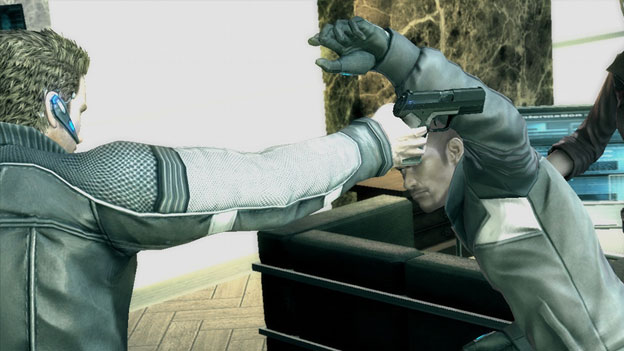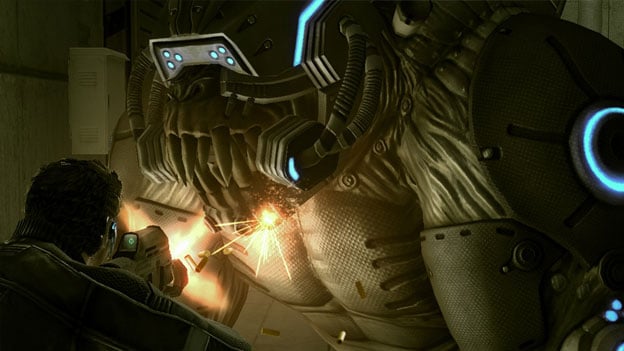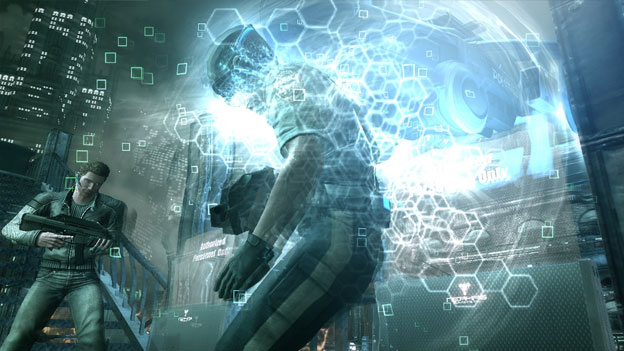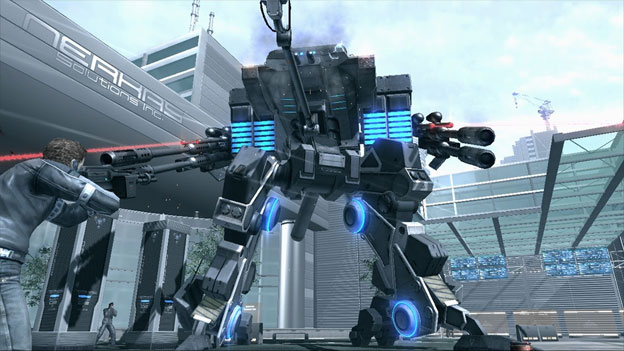Mechanical gorillas…really?
Coming up with a great idea for a game is an important thing. With so many games that are cookie-cutter efforts in their respective genres, it’s nice to have a fresh take once in a while. The unfortunate downside to some of these games is that the wrong developer has come up with the idea. A prime example: Mindjack.
The idea was simple. A third-person science fiction shooter that lets you “mind hack” into anyone or anything, giving the basis for great conceptual gameplay, and a conspiracy-laden story to give the whole thing meaning. The developers behind the game, Feelplus Inc., may have had a little trouble along the way, considering they were shut down in 2010. However, I have a feeling things wouldn’t have turned out very differently even if they were still around.

The year is 2031, and you play as FIA (Federal Intelligence Agency) agent Jim Corbijn. During what appears to be a standard mission, his objective is to pursue an anti-government activist named Rebecca Weiss who is just arriving on a flight from Shanghai. The airport suddenly comes under terrorist attack, and the two are left with only each other to fight for survival. As they make their escape through what seems to be an endless amount of attackers, they reluctantly agree to a truce and slowly begin to unravel the truth underneath the surface of their meeting.
Normally a conspiracy plot can be pretty engaging if it is told in the right way. Unfortunately, there are so many things wrong with its presentation that I don’t even know where to begin saying how bad it is. The two main characters have no depth and very little personality, mostly due to the poorly written dialogue that’s reminiscent of a stereotypical action film. The plot itself is incredibly hard to follow and feels like it was made up at random, especially since there is no real explanation of anything that’s actually going on. You’ll understand what I’m talking about when you fight your first mechanical gorilla.

A story can get away with begin utterly bad, if it has great gameplay to back it up. Sadly, this is probably one of the worst aspects of Mindjack. The cover system is downright atrocious, as it can get very choosy about what you can actually hide behind. Even when it does work, enemies will miraculously find a way to kill you due to the lousy hit detection, which works both ways. Pulling off a headshot can sometimes take anywhere from four to six bullets depending on the weapon. Often times cover is not even necessary due to the horrible enemy AI, who will either charge at you directly or just stand in the open during a gunfight. The same thing goes with your teammate AI, which is annoying because if both of you are downed, it’s game over.
Another very frustrating component of the game is the inability to continually carry weapons. After each scene is completed, your basic inventory is reset and you’re left with scrounging the ground in front of you for a new set of weapons and grenades. It really breaks up the flow of the game, almost as much as the setup of each combat sequence. You’re basically walking through one glorified hallway after another until you reach the next action scenario. Pause, wait for loading screen. Rinse and repeat. Then you’re left with an incredibly mundane boss fight, which usually consists of finding a rocket launcher to defeat the enemy. I suppose it’s a good thing that nothing happens when you’re wandering to the next gunfight, because there is also no functional pause screen. If you go into the menu, the environment and everything around you is persistent, so stopping during a battle is not an option.

The one facet that you would hope to be redeeming, the mind hacking, is yet another huge disappointment. You can take control of enemy targets so long as they are only injured and not killed, and are in close enough range. It can be a decent tactic when fighting a large group of enemies, and particularly useful for flanking, but has a big drawback when changing characters. When you switch roles, you become a disembodied entity known as a Wanderer. During this phase you can either float around to your next mind hacking target or simply do a quick jump from one to the next with a button press.

However, the controls in this instance become slow and awkward during the heat of battle, ruining the fluidity of the game even more. You can easily lose track of your position due to the overhead camera angle before a hack, and the AI flaws don’t make things any easier. Trying to pin down a constantly moving target just makes the whole thing even more awkward. Not to mention that both main characters go into the default AI control and can die at the drop of a hat. Also, much like the inventory resetting mentioned earlier, the same goes for any successfully hacked AI. They simply die once the battle is over, or go back to a cowering fetal position if it was a civilian. So, any hope for building a small squad is all but crushed.
The multiplayer component is a bit strange, and can be even more frustrating than playing alone. There is no local co-op, which should have been an obvious choice, but there is online co-op and competitive multiplayer for up to six players. The entirety of multiplayer exists within the campaign, playing as either a companion or enemy to the host. You begin the session as a Wanderer and need to mind hack into a target in order to participate. There is almost no difference between multiplayer and the campaign in terms of gameplay, but for those who are joining a host’s session it can get repetitive and slow-paced when all you do is hack in and out of bodies. It gets even more tiresome once the game resets (yet again) your character after a fight, leaving you as a floating Wanderer to travel ahead to the next section.
There are so many things wrong with this game, it’s almost hard to keep track. The poorly executed gameplay, the outdated graphics, the lifeless voice acting, the endless loading screens and broken pacing, the sad excuse for a leveling system that’s too bad to even detail; it reads like a laundry list on how to make a bad game. Almost like it was a tutorial. Mindjack is the epitome of the idiom “Looks good on paper.” and it will never be anything more.
RATING OUT OF 5 RATING DESCRIPTION 1.3 Graphics
Textures and facial animations look incredibly outdated. It barely rivals the look of last-gen games. 1.3 Control
The cover system is terrible, and the hacking part of gameplay can be tedious and frustrating. 1.2 Music / Sound FX / Voice Acting
The voice acting is incredibly dull, guns sound like peashooters, and the music is barely worth mentioning. 1.3 Play Value
There really isn’t much fun to be had here. Not even in a masochistic way. 1.3 Overall Rating – Avoid
Not an average. See Rating legend below for a final score breakdown.
| Review Rating Legend | |||
|---|---|---|---|
| 0.1 – 1.9 = Avoid | 2.5 – 2.9 = Average | 3.5 – 3.9 = Good | 4.5 – 4.9 = Must Buy |
| 2.0 – 2.4 = Poor | 3.0 – 3.4 = Fair | 4.0 – 4.4 = Great | 5.0 = The Best |
Game Features:
